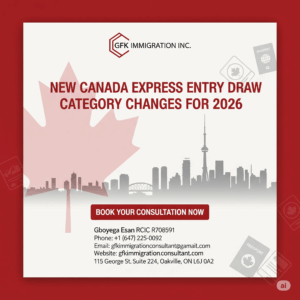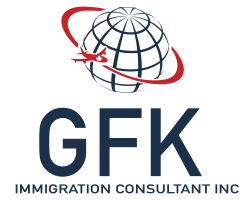
New Canada Express Entry Draw Category Changes For 2026
Canada’s immigration system is set to undergo exciting changes in 2026, as Immigration, Refugees and Citizenship Canada (IRCC) explores new priorities for its Express Entry system.
IRCC is proposing innovative, category-based selection criteria changes and a new category to address evolving economic and labour market needs.
Furthermore, IRCC is proposing eligibility criteria changes to qualify for category-based selection in 2026.
These changes aim to bolster Canada’s competitiveness while continuing to attract skilled workers who can integrate seamlessly into the workforce.
Here’s a deep dive into the proposed Express Entry draw categories’ changes for 2026 and what they mean for Canada’s future.
Table of Contents
How to Get Involved In Deciding 2026 Categories’ Changes
A New Express Entry Draw Category For 2026
One of the most significant proposals for 2026 is the introduction of a new Express Entry category targeting leadership and innovation.
This category shifts from solely addressing long-term labour shortages to proactively selecting candidates who can enhance Canada’s global competitiveness.
The proposed occupations include:
-
- Senior Managers: Experienced professionals who oversee organizational operations and lead teams, driving business success.
- Skilled Military Recruits for the Canadian Armed Forces: Highly specialized personnel from allied countries to strengthen Canada’s military capacity.
- Scientists and Researchers: Innovators whose discoveries can fuel economic growth through cutting-edge advancements.
This forward-thinking approach aims to attract talent that not only fills immediate gaps but also positions Canada as a leader in global innovation.
The IRCC’s consultation survey asks stakeholders to weigh in on the extent to which this expanded focus should be prioritized, with options ranging from “great extent” to “not at all.”
This signals a potential shift toward a more dynamic immigration strategy that balances immediate labour needs with long-term economic goals.
Continuing Existing Express Entry Categories?
The 2026 Express Entry system will likely build on existing priorities, with some refinements based on consultation feedback.
The current categories, introduced in 2023, focus on the below priorities.
-
- Addressing Long-Term Labour Shortages: The 2025 categories target sectors like agriculture and agri-food, healthcare and social services, STEM (science, technology, engineering, and math), trades, and education.
- The consultation asks whether these should remain priorities in 2026 and whether the focus should shift toward candidates already in Canada (e.g., international students or temporary workers) or those abroad.
- Stakeholders are also prompted to comment on the severity and duration of labour shortages in these sectors and whether Express Entry can effectively address them.
- Addressing Long-Term Labour Shortages: The 2025 categories target sectors like agriculture and agri-food, healthcare and social services, STEM (science, technology, engineering, and math), trades, and education.
-
- Supporting Francophone Immigration Outside Quebec: Since 2023, Express Entry has prioritized candidates with strong French proficiency (minimum score of 7 on the Niveaux de compétence linguistique canadiens in all four language abilities).
- This supports economic growth in Francophone communities outside Quebec.
- The consultation seeks feedback on whether this focus should continue, with responses ranging from “great need” to “no need at this time.”
- Supporting Francophone Immigration Outside Quebec: Since 2023, Express Entry has prioritized candidates with strong French proficiency (minimum score of 7 on the Niveaux de compétence linguistique canadiens in all four language abilities).
Potential Changes to Eligibility Criteria
IRCC is exploring adjustments to the eligibility requirements for category-based selection, particularly for labour shortage categories.
Key proposals include:
-
- Extending Work Experience Requirements: Currently, candidates need at least six months of full-time, continuous work experience (or equivalent part-time experience) in a listed occupation within the past three years.
- The consultation asks whether the duration of this requirement should increase to 12 months to ensure candidates have deeper expertise.
- Extending Work Experience Requirements: Currently, candidates need at least six months of full-time, continuous work experience (or equivalent part-time experience) in a listed occupation within the past three years.
- Canadian Work Experience for Regulated Professions: Foreign credential recognition remains a barrier for skilled workers in regulated fields like healthcare and trades.
- IRCC is considering prioritizing candidates with Canadian work experience in these professions to address labour shortages and integration challenges.
Addressing Sector-Specific Needs
The consultation explores the specific needs of sectors currently prioritized in Express Entry.
For example:
- Agriculture and Agri-Food: Stakeholders are asked to detail labour shortages beyond the single occupation currently prioritized and assess the role of Express Entry in addressing these gaps.
- Healthcare and Social Services: With 37 occupations currently targeted, IRCC seeks feedback on the severity of shortages and the effectiveness of immigration in filling these roles.
- STEM, Trades, and Education: Similar questions aim to gauge whether the 11 STEM occupations, 25 trades occupations, and 5 education occupations remain critical for 2026.
- Transportation: Notably, the transportation category, prioritized in 2023 and 2024, was discontinued in 2025.
- IRCC is seeking input on whether this sector still faces significant shortages that warrant reinstatement.
Canada’s Express Entry system is a cornerstone of its economic immigration strategy, designed to attract skilled workers who can contribute to the nation’s prosperity.
The proposed 2026 categories reflect a dual focus: addressing immediate labour market needs while fostering innovation and leadership to secure Canada’s global standing.
By incorporating feedback from the public and stakeholders, IRCC ensures that the system remains responsive to changing economic realities.
The inclusion of leadership and innovation roles could attract top-tier talent, such as senior managers and researchers, who drive job creation and technological advancements.
Meanwhile, continuing to prioritize sectors like healthcare, trade, and francophone immigration ensures that Canada addresses chronic labour shortages and supports diverse communities.
How to Get Involved In Deciding 2026 Categories’ Changes
IRCC’s public consultation is open until September 3, 2025, and invites feedback through an online survey.
IRCC encourages individuals, businesses, and organizations to share their views on the proposed categories, work experience requirements, and sector-specific needs.
This input will shape the final Express Entry categories for 2026, ensuring they align with Canada’s economic priorities.
As Canada prepares for 2026, the proposed Express Entry categories signal a bold step toward balancing immediate labour needs with long-term economic growth.
By targeting leadership roles, maintaining focus on critical sectors, and supporting Francophone communities, Canada is poised to build a stronger, more competitive workforce.
Stay tuned for updates as IRCC finalizes these categories based on consultation feedback, setting the stage for a transformative year in immigration.
What are the existing categories in Express Entry?
The 2025 category-based selection includes French-language proficiency, Healthcare and social services occupations, STEM occupations, Trade occupations, Agriculture and agri-food occupations, and Education occupations. Each requires at least 6 months of work experience in eligible NOC codes (except French proficiency).
What jobs are eligible for Express Entry?
Jobs in TEER 0-3 under the NOC system qualify for the Federal Skilled Worker and Canadian Experience Class programs. The Federal Skilled Trades program is limited to specific TEER 2-3 groups, which include trades, manufacturing, and agriculture-related roles.
Is 450 points enough for Express Entry
It depends on the draw. Recent French proficiency draws had CRS cut-offs as low as 379-481, and Education at 479, so 450 could suffice for those. However, CEC draws require scores between 518 and 547, while PNP draws often require scores above 700, which makes a score of 450 insufficient for general or program-specific draws.
Will CRS drop to 470?
Possible in category-based draws; recent Healthcare cut-offs were 475-510, Education at 479, and French below 400. Trends show variation, but CEC draws remain higher at 518+.
What new category is proposed for Express Entry in 2026?
IRCC proposes a “leadership and innovation” category targeting senior managers, skilled military recruits from allied countries, and scientists/researchers to boost Canada’s competitiveness.
GFK Immigration
Gboyega Esan RCIC R708591
Phone: +1 (647) 225-0092
#CanadaPR #Citizenship #GFKImmigrationExperts #studyincanada #Steinbach #canada #Alberta #studyinaustralia #ielts #studentvisa #studyinusa #studyvisa #immigration #canadavisa #visa #education #internationalstudents #overseaseducation #study #canadaimmigration #ExpressEntry
